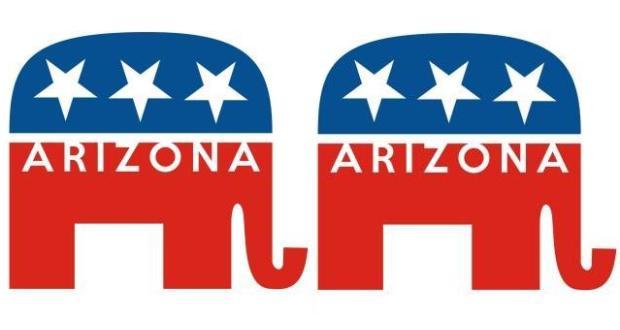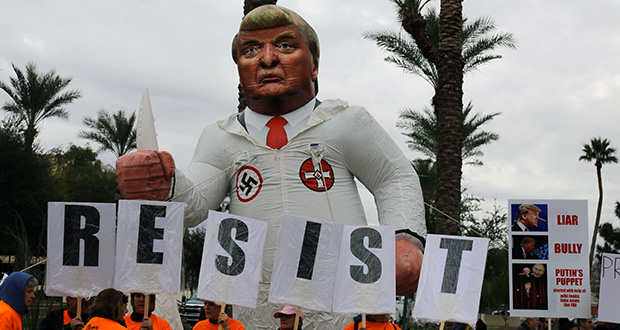Legislature passes measure to undermine dark-money referendum
Howard Fischer, Capitol Media Services//May 9, 2016//[read_meter]
Legislature passes measure to undermine dark-money referendum
Howard Fischer, Capitol Media Services//May 9, 2016//[read_meter]
State lawmakers wrapped up the 2016 legislative session Saturday with what some critics say is a last-minute poke at voters.
Over the objections of several Democrats, the House voted 31-25 to give final approval to HB 2296. The main provision would curb the ability of both the Secretary of State’s Office and the Citizens Clean Elections Commission to demand that certain “social welfare” groups disclose information on their donors.
If all that sounds familiar, it should: The same provisions were in SB 1516 signed into law earlier this year by Gov. Doug Ducey. But the wording of that bill means it cannot take effect until sometime later this summer.
HB 2296 would become law no earlier. But in a bit of legislative sleight of hand, it contains language making it effective, retroactively, later this month.
Rep. J.D. Mesnard, R-Chandler, said the aim was simply to have the provisions in place for this year’s elections.
But Rep. Ken Clark, D-Phoenix, said he sees something more sinister in the measure which is now on the desk of Gov. Doug Ducey.
Clark is spearheading a petition drive to put the provisions of SB 1516 on the ballot in November. If voters reject what lawmakers have done, that legislation self-destructs.
But here’s the thing: If SB 1516 goes away, the law — and specifically the provision designed to go after “dark money” — defaults to the way it was before the November election. And that would be the identical language in HB 2296.
Put another way, the changes in campaign disclosure laws would still remain.
Clark said that leaves only one option: Have two separate petition drives to force a vote on both measures. That adds to the effort and expense.
Mesnard denied that was the intent. But a clearly angry Clark said that does not matter.
“If you are a responsible lawmaker and you know that your actions have an unintended consequence that will force the voters to have to go twice to the ballot to overturn one law, then you are acting against the spirit of our constitution,” he said.
It is a constitutional provision which gives voters the right to have the last word on virtually anything approved by the legislature. It takes just 75,321 valid signatures on petitions gathered within 90 days of the end of the legislative session to put any legislative act on “hold” until voters get to decide whether they want the new law.
But asking voters to review two separate measures, even if they have identical language, means two separate petition drives.
Mesnard conceded Clark’s point.
“That’s true,” he said of the need for two petition drives. But Mesnard said the new version and its retroactive effect is designed to short-circuit what he believes are improper investigations by the Citizens Clean Elections Commission.
That goes to the heart of the battle.
Current Arizona law requires groups that spend money to influence elections to register first with the state. SB 1516 — and now HB 2296 — say none of that is necessary if the groups are registered with the Internal Revenue Service as a non-profit “social welfare” organization. More to the point, the groups would not have to disclose their donors.
Proponents say IRS rules prohibit such groups from spending more than half of their money influencing elections.
But Tom Collins, executive director of the Citizens Clean Elections Commission, said there are two problems with that.
First, he said the IRS does not consider anything spent to promote or kill ballot measures to be political spending. So as long as it spent less than half to elect candidates, it would be free to spend without disclosing donors.
“That’s a real sea change,” Collins said.
Beyond that, Collins the record shows that the IRS does not police these social welfare groups to see how they are spending their money to ensure they are not violating the limits on political spending. With the new law putting a group’s records off limits to state officials, Collins said that pretty much gives them permission to do what they want in secret.
“This bill would result in less disclosure than current law requires of who is contributing money for elections in the state of Arizona,” he said.
Mesnard sees the issue through a different lens: the right of privacy.
“Folks have the right to influence their elected officials because their elected officials are going to influence them and their way of life,” he said during debate on the measure earlier this session.
“The end result is a registry of every person and who they donated to,” Mesnard said. “I think that is entirely dangerous.”
And Mesnard said he would not have pushed the second bill, with its retroactive enforcement date, if Collins’ commission were not trying to look into the books — and the donors — of social welfare groups.
“This is about the Clean Election Commission overstepping its bounds,” he said.
“There’s fear that they’re going to insist on essentially be able to going in and prying open the books of private nonprofits,” Mesnard said. “And we’re trying to say, ‘No, you can’t do that.’ ”


















